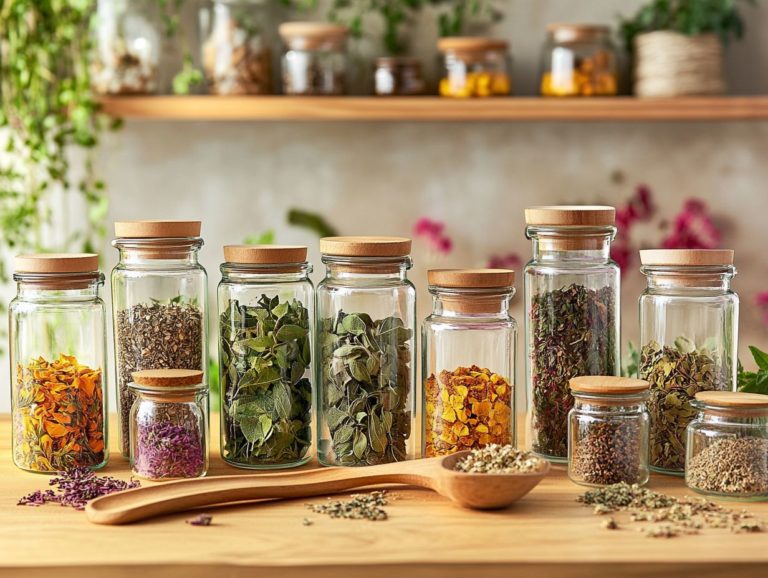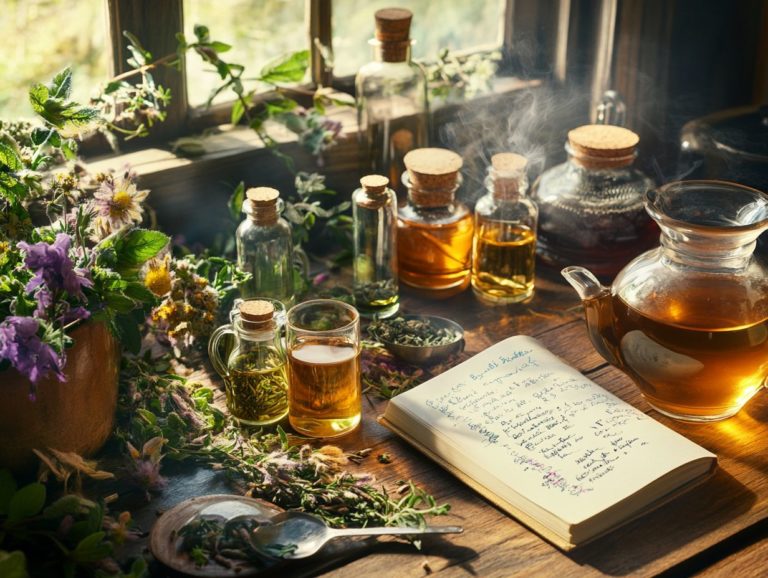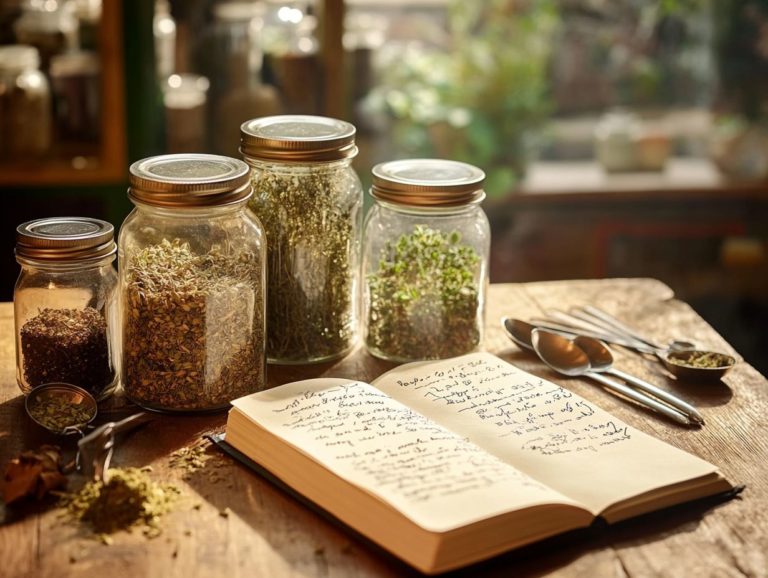The Dos and Don’ts of Herbal Dosage
Exploring herbal supplements is exciting but can also feel overwhelming. These natural remedies hold the promise of various health benefits, but it s essential for you to approach them with caution.
This guide outlines key dos and don’ts for a safe experience with herbal supplements. By consulting healthcare professionals and understanding dosage guidelines, you’ll uncover insights that empower you to make informed decisions.
Whether you re a seasoned user or simply curious about these remedies, this guide will help you maximize benefits while minimizing risks.
Contents
- Key Takeaways:
- 1. Do Consult with a Healthcare Professional Before Starting Herbal Supplements
- 2. Do Follow the Recommended Dosage on the Product Label
- 3. Do Start with a Lower Dosage and Gradually Increase If Needed
- 4. Do Take Breaks from Herbal Supplements
- 5. Do Pay Attention to Potential Interactions with Other Medications
- 6. Do Consider Your Age, Weight, and Health Condition When Determining Dosage
- 7. Do Be Aware of Any Allergies to Certain Herbs
- 8. Don’t Take More Than the Recommended Dosage
- 9. Don’t Mix Different Herbal Supplements Without Consulting with a Professional
- 10. Don’t Rely Solely on Herbal Supplements for Treatment of Serious Health Conditions
- 11. Don’t Take Herbal Supplements If Pregnant or Breastfeeding Without Consulting with a Professional
- 12. Don’t Take Herbal Supplements If Undergoing Surgery Without Consulting with a Professional
- 13. Don’t Ignore Any Negative Side Effects and Consult with a Professional Immediately
- 14. Don’t Use Herbal Supplements as a Substitute for a Healthy Diet and Lifestyle
- 15. Don’t Believe All Claims Made by Herbal Supplement Companies Without Doing Research
- Frequently Asked Questions
- What are the dos and don’ts of herbal dosage?
- Should I consult a healthcare professional before taking herbal supplements?
- What are the recommended dosage guidelines for herbal supplements?
- Can I mix different herbal supplements together?
- Are there any potential side effects of herbal supplements?
- What are the don’ts of herbal dosage?
Key Takeaways:
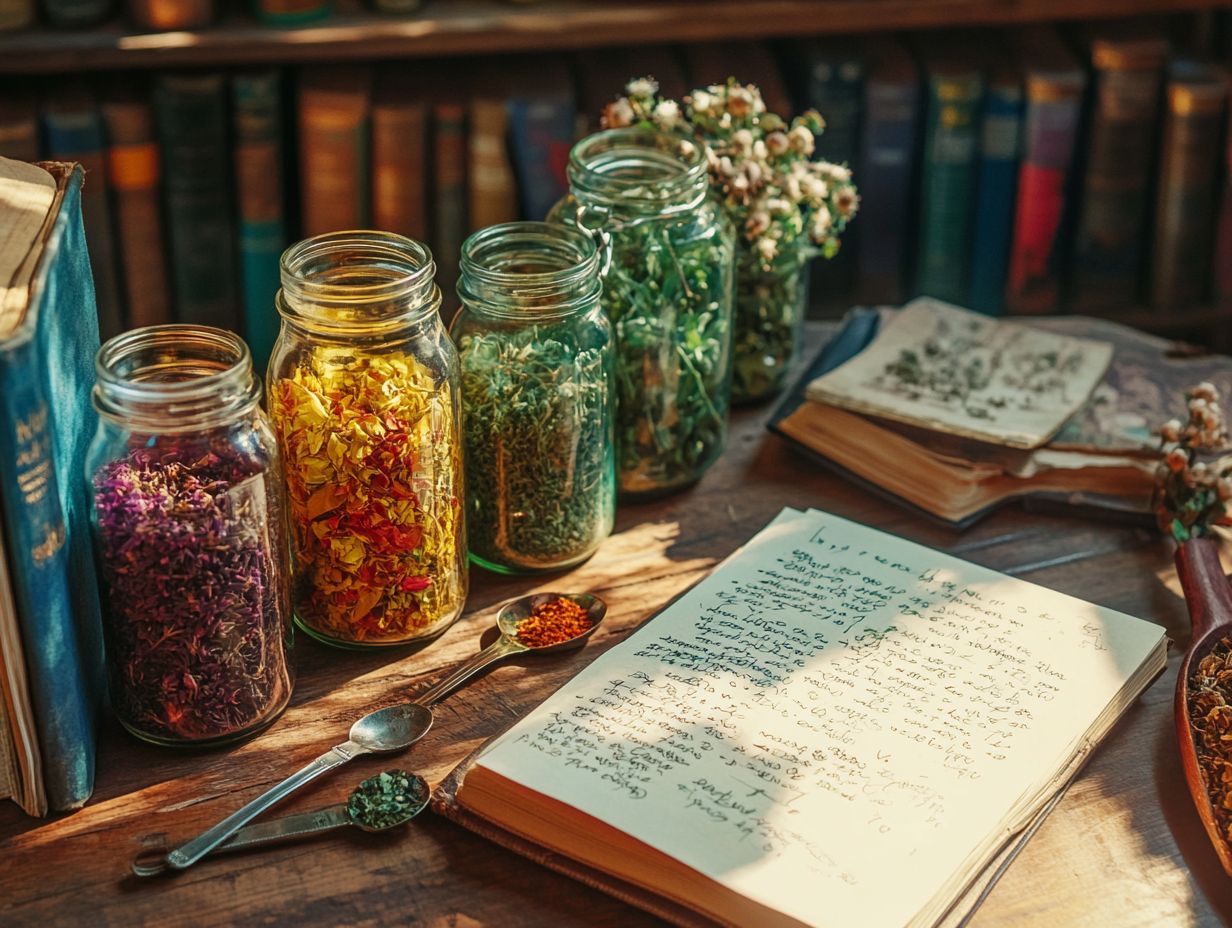
- Always consult a healthcare professional before starting any herbal supplements to ensure your safety.
- Follow the dosage on the label strictly to avoid unwanted side effects.
- Start with a low dosage and increase gradually to find your ideal balance.
1. Do Consult with a Healthcare Professional Before Starting Herbal Supplements
Consulting with a healthcare professional before diving into any herbal supplements is essential for your safety and efficacy. These herbal remedies can contain active ingredients that might interact with regular medications prescribed by a doctor or worsen existing serious health conditions, especially in vulnerable groups like the elderly and children.
Healthcare professionals provide valuable insights not just on the registration of herbal products but also on the potential side effects and interactions tied to specific herbs. Take St. John’s Wort, for example; often touted for mild depression, it can drastically reduce the effectiveness of certain prescription medications. Then there’s Ginkgo, celebrated for its cognitive benefits, yet it comes with the risk of bleeding complications, especially when used alongside blood thinners. Kava, popular for its calming properties, has been associated with severe liver damage. To ensure safe use of these and other herbs, consider following 5 essential tips for safe herbal use.
Being aware of rules set by the Food and Drug Administration concerning herbal medicines can further enhance your understanding of safe practices, including how to measure herbal dosages accurately, enabling you to make informed decisions about your health.
2. Do Follow the Recommended Dosage on the Product Label
Adhering to the recommended dosage on herbal supplement labels is crucial for minimizing the risk of side effects and ensuring safe consumption. These dosages are established based on rigorous quality standards and research.
Ignoring these guidelines can lead to serious side effects. Always prioritize your safety by adhering to the recommended dosage.
Trustworthy retailers like Mountain Rose Herbs and Natural Grocers play a vital role in this journey by offering high-quality products and reliable information. Their dedication to sourcing dependable ingredients not only boosts your confidence as a consumer but also emphasizes the importance of making informed choices in the realm of herbal health.
3. Do Start with a Lower Dosage and Gradually Increase If Needed
Starting with a lower dosage of herbal supplements and gradually increasing it as needed is a wise strategy to mitigate potential side effects. This approach allows your body to acclimate to new active ingredients, especially when self-medicating for various health concerns.
By adopting this gradual approach, you can observe how your body responds before committing to higher amounts, which is crucial for potent herbs. For example, ginger is particularly effective in alleviating nausea and promoting digestion, but starting with a low dose allows you to monitor your tolerance and effects, reducing the risk of digestive upset. Additionally, it’s important to follow herbal dosage guidelines for pregnant women to ensure safety during this critical time.
Similarly, garlic is renowned for its cardiovascular benefits, yet beginning slowly enables you to assess its impact on blood pressure and overall heart health without overwhelming your system. This method enhances safety and ensures that you can maximize the effectiveness of these beneficial herbs.
4. Do Take Breaks from Herbal Supplements
Taking breaks from herbal supplements is important. It helps prevent tolerance and minimizes potential issues from prolonged use.
This strategy maintains better control over your health regimen. It also preserves the effectiveness of herbal products and protects against unwanted side effects.
For example, continuous use of Ginseng may cause its benefits to lessen over time. Similarly, constant use of Licorice Root could disturb your potassium levels, which is vital for your overall health.
By incorporating pauses into your routine, you let your body reset. This enhances the overall effectiveness of these natural remedies.
5. Do Pay Attention to Potential Interactions with Other Medications
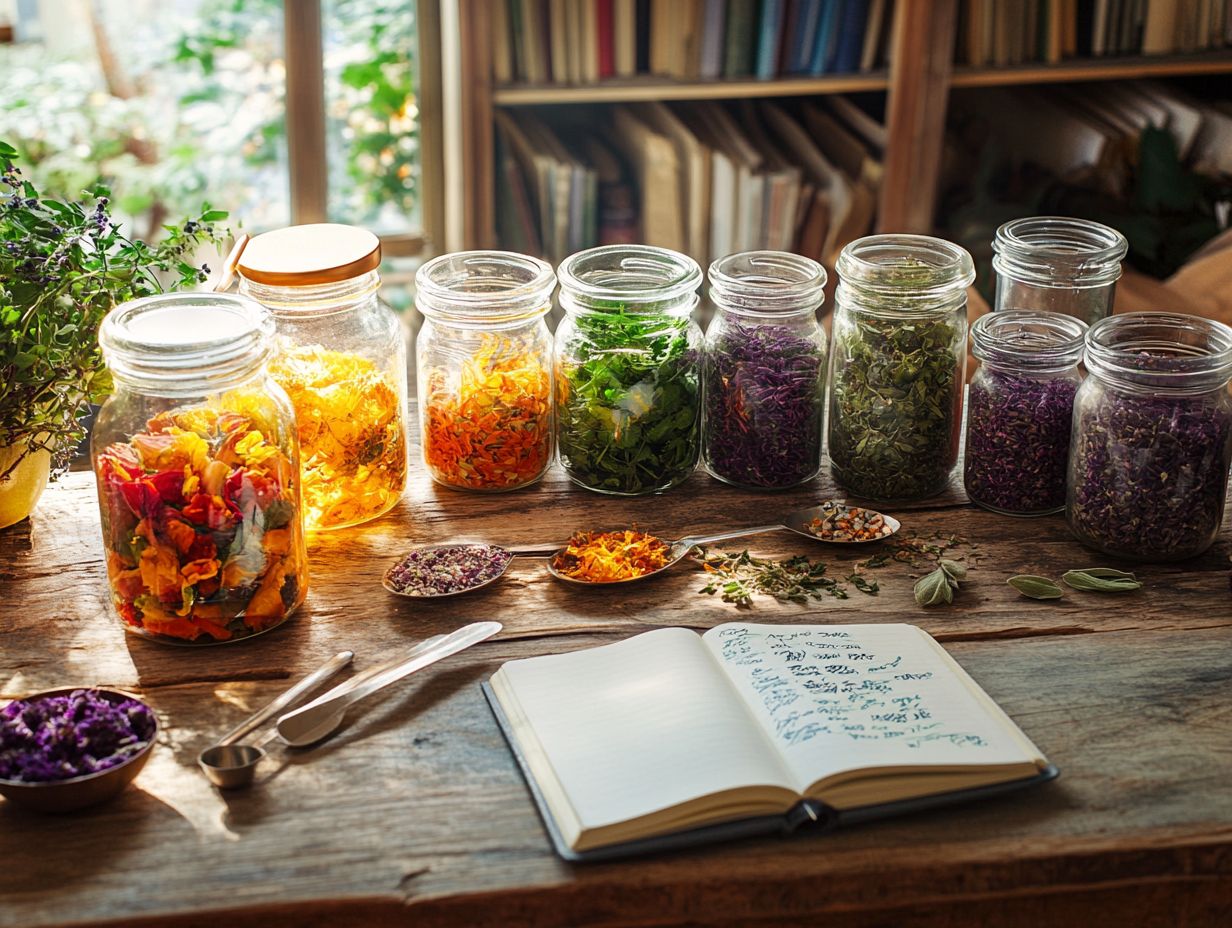
Be vigilant about interactions between herbal supplements and medications. Some herbs can affect how your prescribed treatments work or cause adverse reactions.
For instance, Ephedra can raise blood pressure and heart rate, complicating issues for those on blood pressure medications. Likewise, Ginkgo may increase bleeding risks for people taking blood thinners.
Consulting healthcare professionals offers personalized guidance tailored to your health needs. They help navigate the complexities of herbal and conventional medicine.
Use resources like the Yellow Card Scheme to report any adverse effects. This ensures a safe approach when using herbal supplements.
6. Do Consider Your Age, Weight, and Health Condition When Determining Dosage
When choosing the right dosage for herbal supplements, consider your age, weight, and health conditions. This is especially crucial for vulnerable groups like the elderly and children.
For example, if you have hypertension, closely monitor your condition with supplements like Stinging Nettle, which can affect blood pressure. If you’re managing diabetes, be cautious with certain herbs, like Black Cohosh, which may interact with blood sugar levels.
A tailored approach ensures you enjoy the benefits of herbal supplements safely. Always consult healthcare professionals to find the best options for your health profile.
7. Do Be Aware of Any Allergies to Certain Herbs
Knowing any allergies to specific herbs is vital when considering herbal supplements. Allergic reactions can lead to serious health concerns.
For instance, Aloe and Garlic are known allergens that can provoke reactions. Stay informed about how new herbs might affect you.
Carefully read labels to spot potential allergens. Reflect on any past reactions you’ve had.
Consulting a healthcare professional helps recognize allergies and ensures safe use of herbal supplements. This proactive approach enhances your wellness while minimizing risks.
8. Don’t Take More Than the Recommended Dosage
Exceeding the recommended dosage of herbal supplements can lead to undesirable side effects and potential health risks, emphasizing the importance of following the guidelines established by manufacturers and health authorities.
Take Kava, for example. While it’s often celebrated for its calming effects, consuming too much can result in serious liver damage, especially if mixed with other substances. Similarly, Goldenseal, famous for its detoxifying claims, can cause gastrointestinal distress and may negatively interact with other medications if misused.
These examples serve as stark reminders of the dangers tied to overconsumption.
Seek products tested for purity and potency to minimize risks associated with these powerful natural substances. Stay informed and prioritize your health!
9. Don’t Mix Different Herbal Supplements Without Consulting with a Professional
Mixing different herbal supplements without professional guidance can lead to unforeseen interactions that affect your health or even result in serious side effects.
For example, blending Ginseng and Ephedra can elevate your heart rate and blood pressure, creating risks for anyone with cardiovascular issues. Similarly, combining St. John’s Wort with certain antidepressants can spiral into a dangerous condition known as serotonin syndrome, a serious condition.
Always consult healthcare professionals before considering such combinations, as they can provide tailored advice based on your specific health conditions.
Take action now to prevent adverse effects! This proactive approach enhances the potential benefits of the herbal remedies you choose, such as Kava, Ephedra, Garlic, and Stinging Nettle. Understanding the role of body weight in herbal dosage is crucial for maximizing their effectiveness.
10. Don’t Rely Solely on Herbal Supplements for Treatment of Serious Health Conditions

Relying solely on herbal supplements and active ingredients to tackle serious health conditions can be a risky endeavor. These products don t undergo the same rigorous regulation as conventional medicines, which means they may lack proven effectiveness.
Combine herbal supplements with traditional treatments for better health. This synergy can significantly enhance overall health outcomes, but it s essential to do so under the guidance of healthcare professionals.
By consulting with experts, you can effectively navigate potential interactions between various treatments and prioritize safety and quality control.
Ensure that any alternative or complementary therapies align with established medical advice, particularly when confronting serious conditions, to achieve the best possible results.
11. Don’t Take Herbal Supplements If Pregnant or Breastfeeding Without Consulting with a Professional
If you’re pregnant or breastfeeding, it’s best to steer clear of herbal supplements without first consulting a healthcare professional. Certain herbs can pose risks to both your health and that of your child.
For instance, azulene-rich chamomile, Ginkgo, and Ginger and licorice root may lead to complications such as preterm labor and hormonal imbalances. Likewise, herbs like sage and sesame could negatively impact milk production, while ginseng and evening primrose are linked to potential developmental issues in infants. It’s important to consult resources on herbal remedies and their side effects for safe usage.
Recognize that not all natural remedies are safe during pregnancy. This underscores the importance of seeking professional guidance to ensure that both your well-being and that of your child are protected throughout pregnancy and lactation.
12. Don’t Take Herbal Supplements If Undergoing Surgery Without Consulting with a Professional
Scheduled for surgery? Avoid herbal supplements until you consult a professional!
If you’re preparing for surgery, it’s essential to avoid taking herbal supplements without first consulting a healthcare professional, as certain herbs can interfere with anesthesia and health issues or hinder your recovery afterward. For more information on safe usage, consider checking the dosage recommendations for popular herbs.
This precaution is especially critical when considering specific supplements like Kava and Ephedra. Kava, often hailed for its calming effects, can lead to excessive sedation when mixed with anesthetics, increasing the risk of respiratory complications and limited effectiveness during your procedure. On the other hand, Ephedra can spike blood pressure and heart rate, introducing significant risks during surgery.
Understanding these possible interactions is vital for anyone contemplating herbal remedies. Prioritize an open dialogue with your healthcare provider to ensure safe and effective care, ultimately minimizing the chances of adverse outcomes.
13. Don’t Ignore Any Negative Side Effects and Consult with a Professional Immediately
Notice negative side effects? Consult a healthcare professional immediately!
Ignoring the potential negative side effects of herbal supplements can lead to serious health consequences, making it imperative to consult a healthcare professional and refer to herbal remedies: safe dosage for adults and children as soon as you notice any adverse reactions.
Vigilance in monitoring these side effects is crucial, especially with popular herbs like Black Cohosh and Licorice Root. For example, while Black Cohosh may provide relief from menopausal symptoms, it could also trigger gastrointestinal issues or an allergic reaction in some individuals. Likewise, Licorice Root can elevate blood pressure and lower potassium levels when consumed in excess.
By promptly reporting and managing these reactions, you can safeguard your well-being while reaping the therapeutic benefits of these herbs.
14. Don’t Use Herbal Supplements as a Substitute for a Healthy Diet and Lifestyle
Don t rely on herbal supplements alone. A healthy diet is irreplaceable!
Relying on herbal supplements as a substitute for a healthy diet and lifestyle is a misguided approach; no amount of herbal intervention can truly replace the fundamental benefits of balanced nutrition and active living. To ensure safe and effective use, it’s important to understand herbal dosage guidelines.
Integrating herbal supplements into your holistic health plan can offer added support, enhancing your overall well-being. When you view these natural options as complementary tools rather than primary solutions, they can offer valuable nutrients, antioxidants, and other properties that align seamlessly with your dietary practices. However, it’s important to follow balancing herbal remedies dosage guidelines to ensure their safe and effective use.
It’s essential to remember that these supplements should accompany, not replace, the core pillars of health specifically, a varied and nutritious diet along with regular physical activity. By harmonizing these elements, you can craft a more effective strategy for achieving optimal health and wellness.
15. Don’t Believe All Claims Made by Herbal Supplement Companies Without Doing Research
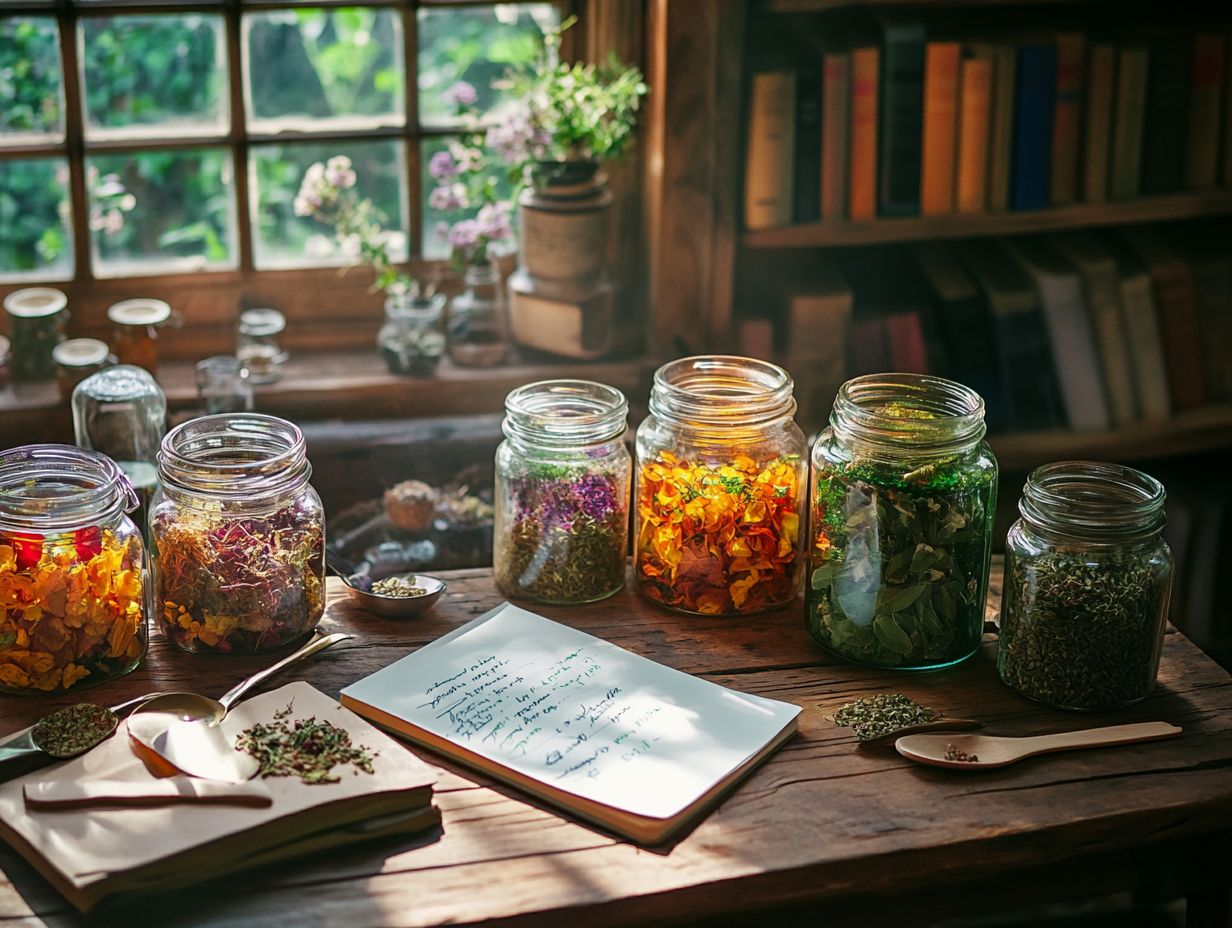
Be skeptical of claims from herbal companies. They often lack solid proof!
Skepticism towards the claims made by herbal supplement companies is entirely justified. Often, these assertions lack the rigorous scientific backing necessary to instill confidence, leading consumers to be misled about their effectiveness and safety.
This skepticism becomes even more critical when you consider the necessity of conducting thorough research before adding any herbal product to your wellness routine. It’s essential for you to verify herbal registration and understand the quality control measures implemented by manufacturers. Additionally, following safety tips for creating herbal remedies ensures that the products you choose are not only legitimate but also safe for consumption.
Check reliable sources like Storey Publishing for trustworthy information, enabling you to make informed decisions. By prioritizing this diligent approach to research, you can navigate the often murky waters of herbal supplements with greater ease and avoid potential pitfalls while seeking natural remedies.
Frequently Asked Questions
For more information, consult with your healthcare provider or do further research on herbal supplements to ensure your health and safety!
What are the dos and don’ts of herbal dosage?
The dos and don’ts of herbal dosage refer to the proper and recommended ways of using herbal remedies for optimal health benefits. These guidelines help ensure safe and effective use of herbs.
Should I consult a healthcare professional before taking herbal supplements?
Yes, it is always recommended to consult a healthcare professional before taking any herbal supplements, especially if you have any pre-existing medical conditions or are taking any medications.
What are the recommended dosage guidelines for herbal supplements?
The dosage of herbal supplements may vary depending on the specific herb, its potency, and your individual health needs. It is important to carefully follow the dosage instructions on the product label or consult a healthcare professional for proper dosage recommendations.
Can I mix different herbal supplements together?
It is not recommended to mix different herbal supplements together without consulting a healthcare professional. Some herbs may interact with each other or with certain medications, which could cause adverse effects.
Are there any potential side effects of herbal supplements?
Although herbal supplements are generally considered safe, they can cause side effects in some individuals, especially when taken in high doses or for extended periods. It is important to be aware of these potential side effects and discontinue use if any adverse reactions occur.
What are the don’ts of herbal dosage?
The don’ts of herbal dosage include not exceeding the recommended dosage, not taking herbal supplements if pregnant or breastfeeding, and not giving herbal supplements to children without consulting a healthcare professional. It is also important not to substitute herbal supplements for prescribed medications without consulting a doctor.


